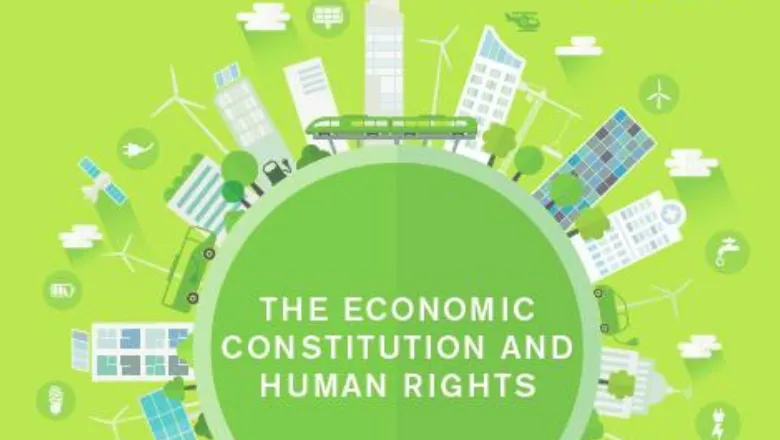10 February 2023
Principles of Enterprise Law: The Economic Constitution and Human Rights, by Dr Ewan McGaughey
Dr Ewan McGaughey’s new book, Principles of Enterprise Law: The Economic Constitution and Human Rights, is an ambitious exploration of how, in the UK, we govern private, public and third sector organisations.

In the book, Principles of Enterprise Law:The Economic Constitution and Human Rights, Dr McGaughey takes a look at the broad landscape in relation to enterprise law, and the practical implications for a range of enterprises, clarifying current principles and asking what other rules we might need to consider.
Rinku Yunusa, from the Faculty of Law Communications team, met Ewan to find out more.
Can you briefly describe what the book is about and what motivated you to write it?
The book is about the governance of the economy and the relationship with public services. My main motivation to write the book was to bridge the gap in existing literature overall, about how our economic constitution functions. We know how our political constitution works: one person, one vote for a parliament; fundamental human rights are protected by Courts; and the executive is managed by government and appointed by parliament. These processes and functions are well understood and documented.
But if we ask how the constitution of our economy works, things are less clear: Who has the power behind voting rights in the economy?; Who is appointing the boards of big companies?; Who can hire and fire the directors?; How are large enterprises financed?; What rights do they provide, e.g. rights to education, health, energy, water. All these things form part of the economic constitution, and these functions are less transparent.
I am motivated by wanting to understand how our world works better.
Do you think that there is a general illiteracy in relation to the governance of economic institutions?
I don’t think people are illiterate, but there isn’t a ‘textbook’ or guide which explains these things as a unified whole. There are lots of legal specialists in different areas, e.g., there are lawyers who tell us how the NHS, rail sector, and big tech and communications work, but there isn’t a common grammar across all these areas.
You tend to find one medical, education, or transport law textbook, but nothing that unifies it all together.
The way my book works is that each chapter works by looking at specific enterprises, how each one is financed, governed, are enforced within it. I am attempting to bridge this gap and create a consistent understanding, while highlighting universalities.
It’s an incredibly ambitious and necessary undertaking. Quite frankly, I’m surprised that it hasn’t been done before. Are you aware if anyone else has attempted anything similar?
My book is about the UK and Europe and is grounded in international human rights law with some comparative US examples. However, about a month or two ago, I found out that some Americans have written a book called ‘Networks, Platforms and Utilities, Law and Policy’. The aim of that book was to also highlight the gap in understanding of regulated industries and it’s even longer than mine! It’s covered similar ground in the US.
Before, there was always an argument that we needed to understand the economic constitution, but it hadn’t been written down. When I first started this job, lots had been written about how private enterprise works, which is company, competition, insolvency law etc, but not enough had been written about the public and regulated sector. Hopefully there will be lots more people writing about this in a lot more places.
Principles of Enterprise Law argues that understanding the economic constitution is key to accessing human rights. How does it go about doing this?
International human rights law has grand objectives. For example, the Universal Declaration of Human Rights says everyone has the right to education including higher education, believe it or not. It also states that everyone has the right to medical care, and we should also have rights to the benefits of science and clean energy. In the UK, we have had the NHS since 1946, with detailed legislation. We have managed to ensure everyone had access to healthcare free at the point of use. That is a good example of a universal human right becoming enshrined in law and government policy.
What human rights law doesn’t necessarily do clearly is tell you how to obtain these universal rights. The book demonstrates how countries can construct governments and public bodies, sometimes in combination with private bodies for certain enterprises such as clean energy in the UK where there are lots of private, but not public developments with clean energy. Overall, I am more interested in social and economic rights.
Another thing we can understand is, once we work out how things happen in Britain and other comparative examples, we can assess which models work best at realising results.
For example, the US spends three times per head more than the UK on healthcare, but the US has declining life expectancy with a defective privatised system of health which gauges people in prices. We can look empirically which models work better dependent on which outcomes we want to see. Higher life expectancy, cleaner energy, faster internet are all simple metrics from which we can understand the success of enterprise.
Who is the intended readership? Is your book intended for a broad readership?
I would love it if it the book had a broad readership, but this is a law book and primarily intended for students, practitioners, and legal professionals. It does have a very substantial history section and you don’t necessarily need to be a lawyer to grasp the main concepts and argument. The governance and case law in it are legalistic, but I hope it’s also accessible to economists. There is a lot of economic theory in it about how to organise the economy, workplaces, corporate governance. It will be of interest to lawyers, historians, economists, and lay readers - everyone should buy it basically!
Anything else to add?
It is 700 pages of pure gold!


